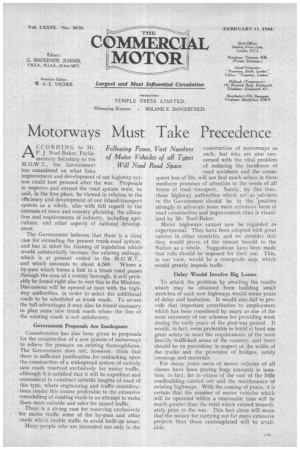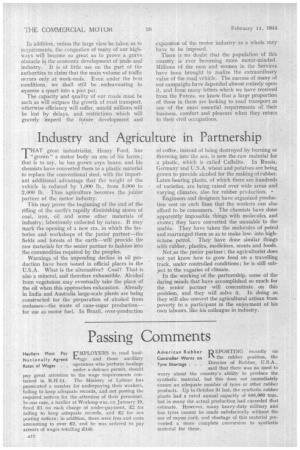Motorways Must Take Precedence
Page 13

Page 14

If you've noticed an error in this article please click here to report it so we can fix it.
ACCORDING to Mr. P. J. Noel-Baker, Parlia mentary Secretary to the M.O.W.T„ the Government has considered on what lines improvement and development of our highway system could best proceed after the war. Proposals to improve and extend the road system mutt, he said, in the first place, be viewed in relation to the efficiency and development of our inland-transport system as a W hole, also with full regard to the interests of town and country planning, the allocation and requirements of industry, including agriculture, and other aspects of national development.
The Government believes that there is a clear case for extending the present trunk-road.system, arid has in mind the framing of legislation whichwould substantially increase the existing mileage, which is at present vested in the •M.O.W.T., and which amounts to about 4,500. Where a by-pass which forms a link in a trunk road passes through 'the area of a county borough, it will probably be found right also to vest this in the Minister. Discussions will be opened at once with the highway authorities, in order to select the additional roads to be scheduled as trunk roads. To secure the full advantages it may also be found necessary to plan some new trunk roads where the line of the existing roads is not satisfactory.
Government Proposals Are Inadequate Consideration has also been given to proposals for the construction of a new system of motorways to relieve the pressure on existing thoroughfares.The Government does not, however, think that there is sufficient justification for embarking upon the construction of a widespread system of entirely new roads reserved exclusively for motor traffic, although it is satisfied that it will be expedient and economical to construct suitable lengths of road of this type, where engineering and traffic considerations render this course preferable to the extensive remodelling of existing roads in an attempt to make them more suitable and safer for mixed traffic.
There is a strong case for reserving exclusively for motor traffic some of the by-pass and other roads which enable traffic to avoid built-up areas. Many people who are interested not only in the construction of motorways as such, but who are also concerned with the vital problem of reducing the incidence of road accidents and the consequent loss of life, will not find much solace in these' mediocre promises of attention to the needs of all forms of road transport. Surely, by this time, those highway authorities which act as advisers to the Government should be in the position strongly to advocate. some more extensive form of road construction.and improvement than is visualized by Mr. Noel-Baker: Motor highways cannot now be regarded as experimental. They have been adopted with great -success in other countries, and we consider that they would •prove of the utmost benefit to the Nation as a. whole. Suggestions have been made that tolls should be imposed for their use. This, in our view, would be a retrograde step, which would greatly impede traffic.
Delay Would Involve Big Losses To attack the .problem by awaiting the results which may be obtained from building small stretches of such new highways would mean years of delay and hesitation. It would also-fail to provide that important contribution to employment which has been .considered by many as one of the most necessary of our schemes for providing work during the early years of the post-warperiod. It would, in fact, seem preferable to build at least one great artery to meet the requirements Of the most heavily trafficked areas of the country, and there should be no parsiniOny in respect of.the width of the tracks and the provision of bridges, safety crossings and materials.
For many years users of motor vehicles of all classes have been paying huge amounts in taxation, in fact, far in excess of the cost of the little roadbuilding carried out and the maintenance of existing highways. With the coming of peace, it is certain that the number of motor vehicles which will be operated within a reasonable time will be much greater than the total which existed immediately prior_to the war. This fact alone will mean that the money for carrying out far more extensive projects than those contemplated will he available. In addition, unless the large view be taken as to requirements, the congestion of mahy of our highways will become so great as to prove a grave obstacle in the economic development of trade and industry. It is of little use on the part of the authorities to claim that the main volume of traffic occurs only at week-ends. Even under the best conditions, we shall still be .endeavouring to squeeze a quart into a pint pot.
The capacity and quality of our roads must be such as will outpace the growth of road transport, otherwise efficiency will suffer, untold millions will be lost by delays, and restrictions which will gravely imperil the future , development and expansion of the motor industryas a whole may have to be imposed.
There is no doubt that the population of this country is ever becoming more motor-minded. Millions of the men and women in the Services have been brought to realize the extraordinary value of the road vehicle. The success of many.of our campaigns have depended almost entirely upon it, and from many letters which we have received from the Forces, we know that a large proportion of those in them are looking to road transport as one of the most essential requirements of their business, comfort and pleasure when they return to their civil occupations.




















































